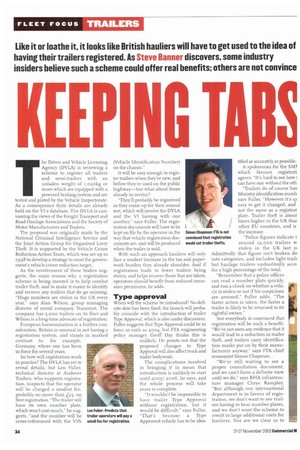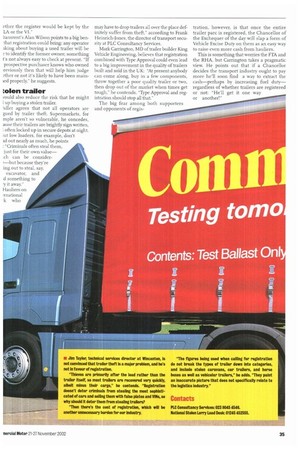KEEPING IA
Page 34

Page 35

If you've noticed an error in this article please click here to report it so we can fix it.
Like it or loathe it, it looks like British hauliers will have to get used to the idea of having their trailers registered. As Steve Banner discovers, some industry insiders believe such a scheme could offer real benefits; others are not convince
The Driver and Vehicle Licensing Agency (DVLA) is reviewing a scheme to register all trailers and semi-trailers with an unladen weight of 1,ozokg or more which are equipped with a powered braking system and are tested and plated by the Vehicle Inspectorate. As a consequence their details are already held on the VI's database. The DVLA is canvassing the views of the Freight Transport and Road Haulage Associations and the Society of Motor Manufacturers and Traders.
The proposal was originally made by the National Criminal intelligence Service and the Joint Action Group for Organised Lorry Theft. It is supported by the Vehicle Crime Reduction Action Team, which was set up in 1998 to develop a strategy to meet the government's vehicle crime reduction target.
As the involvement of these bodies suggests, the main reason why a registration scheme is being mooted is to help combat trailer theft, and to make it easier to identify and recover any trailers that do go missing. "Huge numbers are stolen in the UK every year," says Alan Wilson, group managing director of rental company Transrent. The company has 5,000 trailers on its fleet and Wilson is a long-time advocate of registration.
European harmonisation is a further consideration. Britain is unusual in not having a registration system, and stands in marked contrast to, for example. Germany, where one has been in force for several years.
So how will registration work in practice? The DVLA has yet to reveal details, but Len Fuller, technical director at Andover Trailers, who supports registra tion, suspects that the operator will be charged a modest fee, probably no more than Las, on first registration. "The trailer will have its own number plate,
which won't cost much," he sugLen Fuller: Pre gests, "and the number will be trailer operat cross-referenced with the VIN small fee for
(Vehicle Identification Number) on the chassis."
It will be easy enough to register trailers when they're new, and before they're used on the public highway—but what about those already in service?
"They'll probably be registered as they come up for their annual test, which will involve the DVLA and the VI liaising with one another," says Fuller. The registration documents will have to be kept on file by the operator in the way that vehicle registration documents are, and will be produced when the trailer is sold.
With such an approach hauliers will only face a modest increase in the tax and paperwork burden they already shoulder. And if registration leads to fewer trailers being stolen, and helps recover those that are taken, operators should benefit from reduced insurance premiums, he adds.
Type aipproval
When will the scheme be introduced? No definite date has been fixed, the launch will probably coincide with the introduction of trailer Type Approval, which is also under discussion. Fuller suggests that Type Approval could be in force as early as zoo+ but FM engineering policy manager Geoff Day thinks this is unlikely. He points out that the proposed changes to Type Approval will also affect truck and trailer bodywork.
The complications involved in bringing it in mean that introduction is unlikely to start until 200 5/ 2006, he says, and the whole process will take years to complete.
"It wouldn't be impossible to have trailer Type Approval without registration, but it
dicts that would be difficult," says Fuller.
ors wiii pay a "That's because a Type
registration. Approved vehicle has to be iden
tilled as accurately as possible.' A spokesman for the SM? which favours registrati agrees: "It's hard to see how can have one without the oth "Trailers do of course has Ministry identification numb says Fuller. "However it's qt easy to get it changed, and not the same as a registrat plate. Trailer theft is about times higher in the UK thar other EU countries, and is the increase.
"Police figures indicate t around 12,000 trailers w
stolen in the UK last yi Admittedly that figure isn't broken do into categories, and includes light trail( but haulage trailers undoubtedly accoi for a high percentage of the total.
"Remember that a police officer can read a number plate quiddy, and run a check on whether a vehicle is stolen or not if his suspicions are aroused," Fuller adds. "The faster action is taken, the faster a trailer is likely to be returned to its rightful owner."
Not everybody is convinced that registration will be such a benefit. "We've not seen any evidence that it would lead to a reduction in trailer theft, and trailers carry identification marks put on by their manufacturers anyway," says FTA chief economist Simon Chapman.
"We're still waiting to see a proper consultation document, and we can't form a definite view until we do," says RHA infrastructure manager Chrys Rampley. "But although our international department is in favour of registration. we don't want to see trailers having to bear number plates, and we don't want the scheme to result in large additional costs for hauliers. Nor are we clear as to ether the register would be kept by the LA or the VI."
'ransrent's Alan Wilson points to a big benthat registration could bring: any operator lung about buying a used trailer will be e to identify the former owner; something L's not always easy to check at present. "If prospective purchaser knows who owned reviously then that will help him judge ether or not its likely to have been mainLed properly," he suggests.
toien trailer
would also reduce the risk that he might I up buying a stolen trailer.
Uller agrees that not all operators are gued by trailer theft. Supermarkets, for mple aren't so vulnerable, he concedes, ause their trailers are brightly sign written, often locked up in secure depots at night. .ut low loaders, for example, don't id out nearly as much, he points : "Criminals often steal them, just for their own valuech can be consider!---but because they're ing out to steal, say, excavator, and d something to y it away." Hauliers on Tnational .k who may have to drop trailers all over the place definitely suffer from theft," according to Frank Heinrich-Iones. the director of transport security at PLC Consultancy Services.
Mark Carrington, MD of trailer builder Vehicle Engineering, believes that registration combined with Type Approval could even lead to a big improvement in the quality of trailers built and sold in the UK: "At present anybody can come along, buy in a few components, throw together a poor quality trailer or two, then drop out of the market when times get tough," he contends. "Type Approval and registration should stop all that."
The big fear among both supporters and opponents of regis
tration, however, is that once the entire trailer parc is registered, the Chancellor of the Exchequer of the day will slap a form of Vehicle Excise Duty on them as an easy way to raise even more cash from hauliers.
This is something that worries the FTA and the RHA, but Carrington takes a pragmatic view. He points out that if a Chancellor decides the transport industry ought to pay more he'll soon find a way to extract the cash—perhaps by increasing fuel duty— regardless of whether trailers are registered or not: "He'll get it one way or another!"




























































































































































